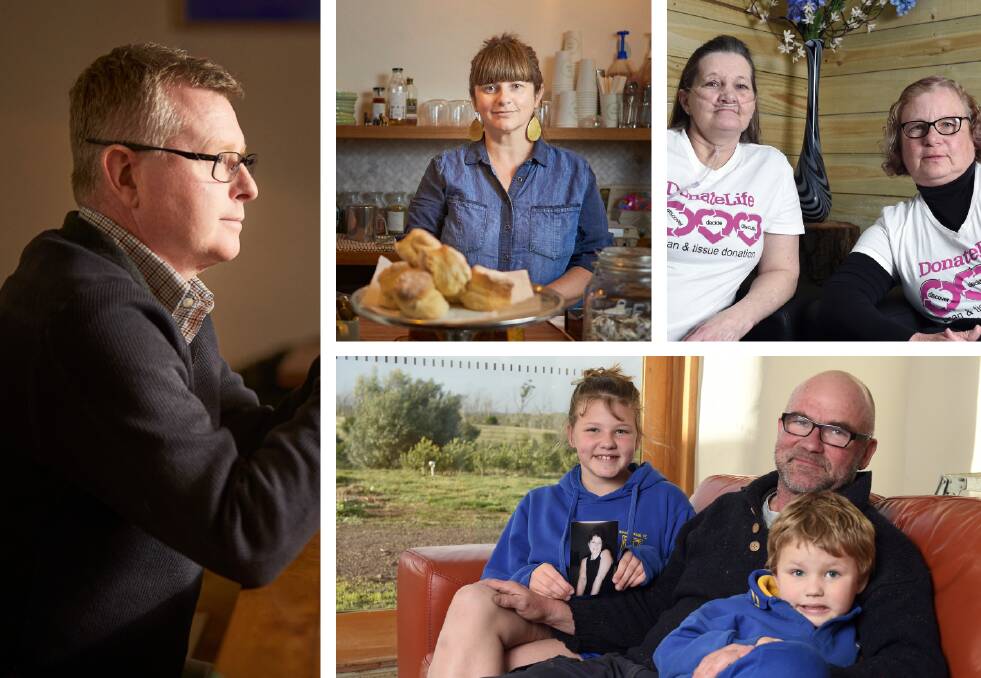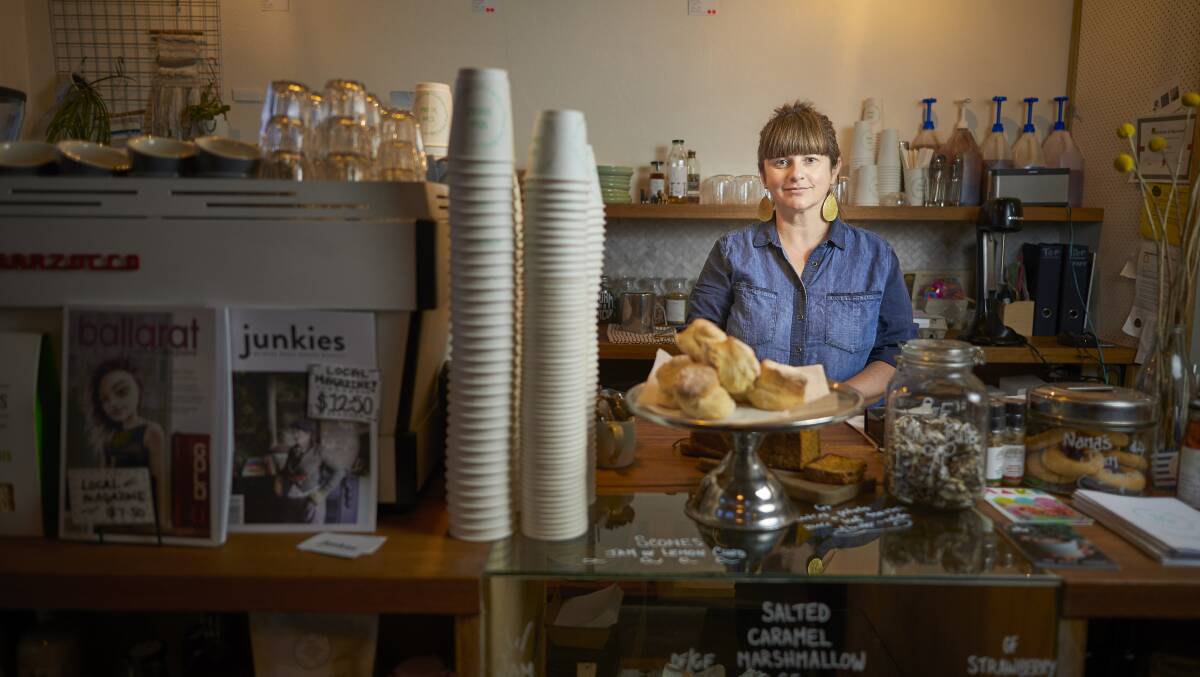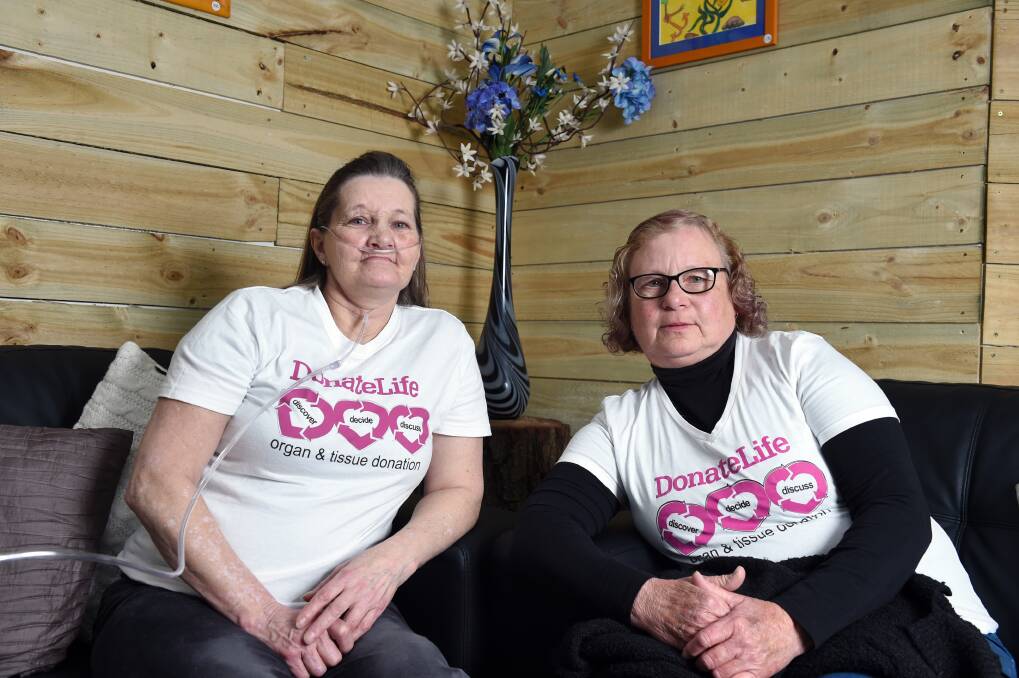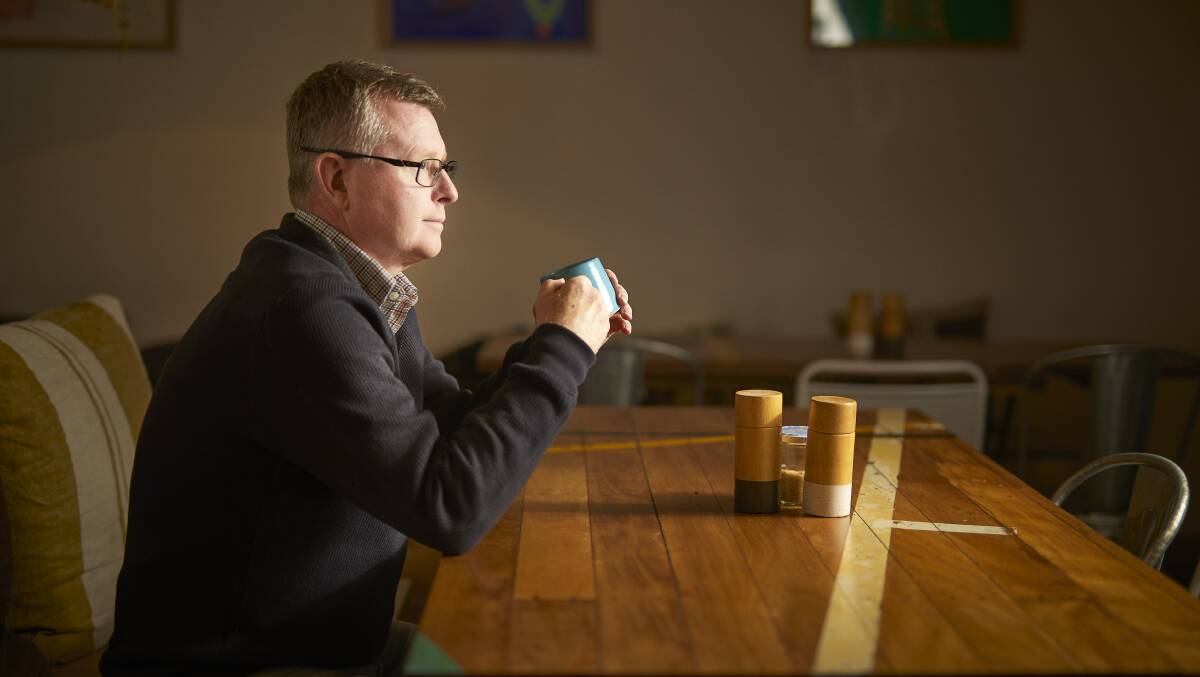Ballarat, this is one stat we should be proud to be leading

BALLARAT has more residents signed up to become potential life savers than in any other Victorian town or suburb. But only one in five Victorians have signalled their intentions on the Australian Organ Donor Registry. This DonateLife week, reporter MELANIE WHELAN takes a look at how a conversation with loved ones could change a life.
THE MISSED OPPORTUNITY
CHARLIE Simmonds was tantalising close to receiving a life-changing gift – twice – only to each time be deemed not quite viable.
His family would rush him to Melbourne from their Trentham home and he would return still with some hope, doing what he had to do and what he loved to do. The popular pastry chef would watch his beloved Sydney Swans and go on holidays with his young family.

One night, Charlie cooked dinner for his children and was in conversation with his wife Tracey when there was a halt in the conversation. Tracey turned around and in that brief moment her family’s life had changed.
Charlie had collapsed and died. He was 38 years old.
Charlie had been waiting for a heart and lung transplant for about three years.
He had been a healthy and active man but increasing started to feel unwell with shortness of breath and chest pain.
Tracey says Charlie never said much about the pain, They had a young family and were building a house so it seemed likely to be stress. Tests finally revealed Charlie had secondary pulmonary hypertension, aged 35.
To have not found the right donor match is still a devastating reality for Tracey and her two children, 17 years after Charlie’s death.
Tracey wants people to consider if they were sick enough to need and want an organ or tissue transplant, then they should be just as willing to register as a donor.
Her hope is to spark discussion and increase the potential for saving others’ lives.
I don't know why it's so taboo. This isn't something to be scared about. It's done in a respectful way and it's a great way to honour a life.
- Tracey Simmonds
“We talk about gay marriage and equality and human rights. There should be much more talk about saving lives,” Tracey said.
“...Nobody wants to organise a funeral for someone they love. Not for someone who is 38 years old.”
Tracey is open to speaking with anyone who may have questions. She at least wants people to know her cafe The Local is a safe place to take some time out or to start the conversation with loved ones about donation.
It is a subject all her family and friends are passionate about.
This week, The Local will put stickers on coffee cups for DonateLife awareness. Her friends and fellow cafes Kittlety’s, Campana’s, Webster’s, The Blackwood Merchant and Trentham General will do the same in support.
Tracey said her children continue to struggle, having grown up without a dad. Her son, in particular, has found it hard despite Tracey’s best efforts to do fishing and football.
Charlie’s legacy lives on in a scholarship at Trentham Primary School. And Tracey has started to bake.
“I couldn’t bake a cake before but decided to teach myself,” Tracey said. “At first, after Charlie died, I went into nursing because I wanted to save lives. But now, there’s a connection in the cafe. We make everything from scratch. I think he would like that.”
THE WAIT
COLLEEN Jennings has been waiting “a long time” for new lungs. When first diagnosed with Chronic obstructive pulmonary disease, Colleen struggled to learn more about the irreversible condition damaging her lungs.
And she had no idea how to get on the list for a double lung transplant.

Fortunately for Colleen, she found the Clunes-based Spare Parts Club, a support group for people affected by organ donation at any stage of the journey. For the Colleen, who lives in Creswick, the group has been her lifeline.
“I didn’t know what’s expected of me, I didn’t know anything to begin with. A lot of the information is really confronting,” Colleen said. “Being rural, there is a difference in access for medical issues but others in the club know what you’re going through.”
Colleen said damage was done to her life by the time she was eight years old, predominantly from passive smoking among a large family of smokers and at a time when little was publicly known about the dangers.
It is now at a point where Colleen has trouble going shopping. She relies on others to driver her places, excepting the transport she receives for medical appointments, like gym rehabilitation in Ballarat.
If I didn’t have the Spare Parts Club, I might’ve given up.
- Colleen Jennings
Spare Parts Club founder Barbara Merryfield has even stepped in to be Colleen’s nominated support person in the transplant process.
“A transplant will take away my isolation and give me better quality of life,” Colleen said. “It will give me purpose in life.”
Colleen urges people to learn more and consider donation, to know “it’s more than ticking a box on your driver’s licence”, you still need to join the Australian Organ Donor Register.
The more who are prepared to consider donation, the greater chance she has to find the right fit.
Until then, Colleen remains on standby.
THE RECIPIENT
FINDING the right words to say thank you keeps lingering on Brian Barnes’ mind. A kidney transplant has completely transformed his life.
Gradually he is working on the right words to thank the family who gave him his life back, even though he can hardly imagine what they have gone through in giving him the gift.

Brian does not know his donor or their family. Only that they are generous.
He wants them to know he is treasuring this gift and making the most of every moment in his second chance.
Brian considers himself one of the luckier ones to have been on an organ transplant waiting list because he could do dialysis and stay relatively healthy in the wait.
But dialysis was also far from easy on Brian’s life.
Brian’s kidneys had failed five years ago. He had been diagnosed with polycystic kidney disease about a decade earlier and growing cysts had gradually damaged kidney tissue.
Kidney failure put Brian on to an active waiting list for a deceased donor and he started dialysis.
For almost four years, Brian was hooked up to a dialysis machine three afternoons a week for four and a half hours.
“Dialysis created big life changes for myself and my family. We were limited on where we could go and travel,” Brian said. “For me, dialysis was tough mentally and physically. Nobody wants to go on it.”
You get into a routine but it gets to a point when you start to think maybe they’ve forgotten me.
- Brian Barnes
Brian got the call while fishing in Warrnambool early last year. In shock, he managed to get himself back to Ballarat and prepared as best as he could for the operation.
This was just the beginning.
“You keep thinking, ‘I can’t believe it’s going ahead. Finally it’s my turn’. Bur in hospital, they are careful not to give you false hope,” Brian said. “Once you get the transplant, you keep your fingers crossed. There is a chance there could be rejection.”
This is partly why he has been lingering on finding the right words to say thank you.
Brian wanted to ensure he got through the potential of rejection. He wanted to ensure he was healthy and active. He wants the family to know he is taking the best care of their gift.
Brian also wants others to know how much such a gift can change a life.
“Anyone could be in a situation when it could happen, when you might need one,” Brian said. “If tomorrow you are in a situation and you or one of your loved ones needed a transplant, I’m sure most would accept.”
But if you would accept, you should also be prepared to give.
About 1,400 people are currently wait-listed for a transplant in Australia. A further 11,000 people are on dialysis and could benefit from a kidney transplant.
THE GIFT
IT WAS short conversation but in that time, Matt Thain and his extended family knew each other’s wishes.
Matt said the talk was likely prompted by something as simple as a story they had seen on the news or read in a newspaper. It was enough to ensure they were clear if a decision ever needed to be made on organ donation.

Two months before her 40th birthday, Sally Thain had a seizure and a heart attack in her sleep.
Matt and paramedics worked on his wife and got her pulse going again. Sally was placed in an induced coma and a few days later the decision was made to turn her life support off.
Until that night, three years ago, Sally had been healthy and full of life.
Sally became a donor, something Matt and their children are so proud about. They knew it was her wish.
“This was a conversation we’d had. We’d all spoken about it as a mob. It does help in a way, knowing what decision to make. At that time, you’re trying to find any thread to give you comfort,” Matt said.
“I don’t ever push people that they have to be an organ donor.
It is an individual thing, how you feel about it...I always say to have the conversation. It doesn’t have to be difficult.
- Matt Thain
BALLARAT TAKES LEAD IN REGISTRY
MORE residents in Ballarat have signed up to become potential life savers than in any other Victorian town or suburb.
A total 655 Ballarat residents recorded their intentions to become a organ or tissue donor last year with the Australian Organ Donor Register – and this is only for the 3350 postcode, not taking into account the wider Ballarat region.
This comes as Victoria hit the one million registrations milestone this month, according to new figures released ahead of DonateLife Week. One in five Victorians have registered their decision.
When a person was registered, their decision was upheld nine times out of 10 by family, according to Donate Life. But, when the family was unaware, more than half will decline organ and tissue donation.
Cranbourne (604) and Werribee-Point Cook (593) round out the top three areas for donor registrations. Geelong (449) and Bendigo (425) were the only other regional towns in the top 10.
Almost everyone can help others through organ and tissue donation. The main factors are where and how a donor dies and the condition of their organs and tissue. Far more people can donate tissue as eye and tissue donations can be made up to 24 hours after death, regardless of where death occurs.
For more or to register: donatelife.gov.au.


